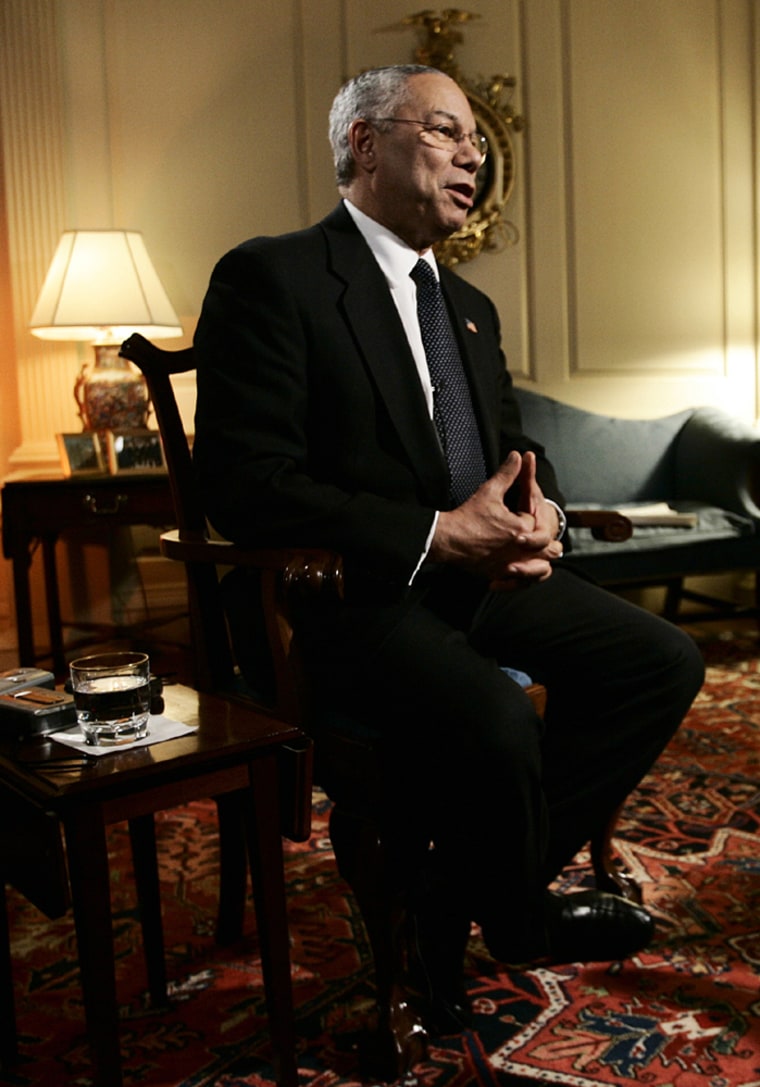With only about a month left as America’s top diplomat, Secretary of State Colin Powell says he has no sure plans for the future. But, he says “doors will open and some of them I will go through.”
In a farewell interview Friday with The Associated Press, Powell virtually ruled out taking another full-time government job, although he said, “I will be in public life in some way.”
“I’ve still got some treadwear left on me,” the 67-year-old career soldier-diplomat said.
Known to have a strong interest in promoting education among disadvantaged children, Powell said, “I’m interested in any child being left behind.”
“I wouldn’t be surprised if working in the field of mentoring or education or something like that does not appear on my calendar,” he said.
No regret over Iraq WMD claims
Looking back on nearly four years as secretary of state, Powell expressed no regret for using ultimately flawed and exaggerated claims about Saddam Hussein’s weapons stockpiles to ask the United Nations last year to back war with Iraq.
And he dismissed any suggestion his personal credibility suffered when no weapons of mass destruction were found, although he said most information about Saddam’s intentions turned out to be accurate.
“It wasn’t a personal thing with me,” Powell said. “It was a presentation of the best information we had.”
Powell, widely seen as trying to restrain Vice President Dick Cheney, Defense Secretary Donald H. Rumsfeld and other hawkish advisers to President Bush, Powell said was “fully supportive” of the approach the administration took before the war.
Powell characterized the strategy this way: “Try to solve it peacefully. If you can’t solve it peacefully and the problem is still there and it does require military action, then get a coalition to undertake that military action.”
Diplomacy with North Korea, Iran
On two troubled fronts, North Korea and Iran, Powell said diplomacy appears to be making headway toward ending the two countries’ nuclear weapons programs — without the need to repeat the use of force that toppled Saddam Hussein in Iraq.
In the 25-minute interview, Powell calmly assured North Korea and an anxious international community that “we have no hostile intent, we have no intention of invading.”
As for Iran, Powell said he did not know of any American military action being contemplated. “Obviously, at the Pentagon they are always thinking about the unthinkable, but there are no military plans,” he said.
Powell said the administration had put a spotlight on Iran’s nuclear activity, persuading the world to be concerned.
He said he hoped European allies who have taken the lead in diplomacy with Tehran can persuade Iran to stop enriching uranium and other nuclear weapons programs.
“Until there is absolutely no doubt in anyone’s mind that that they are not hiding something, I think it is wise in this case to be somewhat suspicious,” he said.
Unpopular policies
Turning to the Middle East, Powell said Israel had shown flexibility toward the Palestinians in advance of their Jan. 9 elections and that the United States was prepared to work with whomever is chosen to succeed Yasser Arafat as their leader.
“There is no question that in Europe and in other parts of the world, the Arab world, the Muslim world, there is a negative view towards some of our policies,” Powell said.
“Our policies in Iraq and some of the issues associated with the Israeli-Palestinian conflict have caused us to get negative ratings,” he said.
“But I don’t believe it is against America. I think it is against these policies. And if these policies turn out to demonstrate to the world that they are the correct policies” attitudes will change for the better, Powell said.
